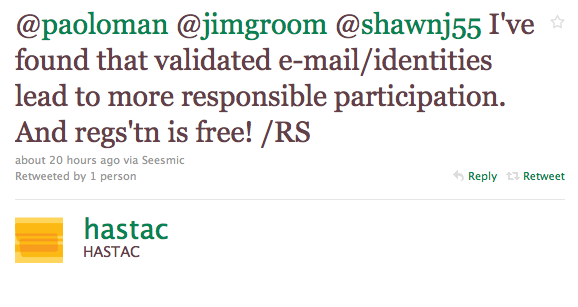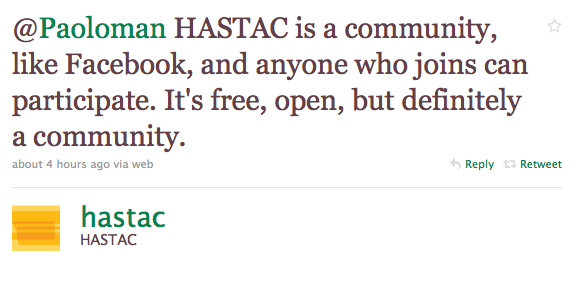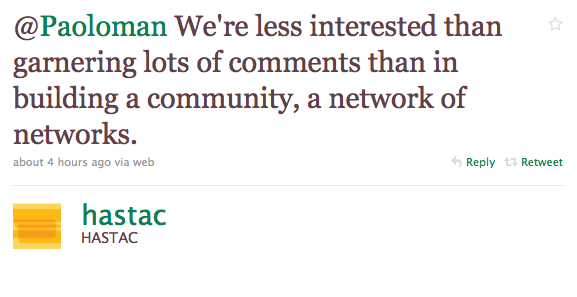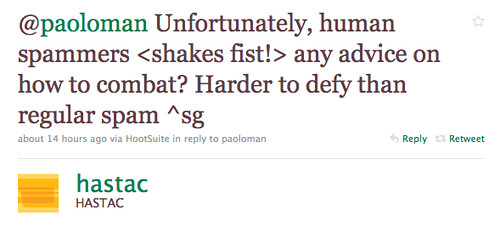I was pointed to this post by Cathy Davidson about BlackBoard yesterday via this tweet by Shawn Miller, and I was interested in her post about BlackBoard and was ready to comment when I noticed that I had to register to do so. Now I know registering to comment is not the end of the world, but at the same time I immediately lose the impetus to share my thoughts when I have to go through a registration process, get a password (that is in some one else’s database), and then activate my account to leave a simple comment about my own issues with BlackBoard. Fact is, I won’t do it, it is too much overhead, and not worth the bother. Also, it suggests an obstacle to participating and sharing that is in many ways unnecessary.
I said as much on Twitter to two HASTAC community members:
 To which the response was basically we’re not too sure, let’s ask HASTAC, and the HASTAC twitter responded a few times:
To which the response was basically we’re not too sure, let’s ask HASTAC, and the HASTAC twitter responded a few times:

So, being a community member makes you more responsible? Not certain of this, but I am pretty certain it cuts back on the conversation significantly and said as much:
 The conversation went on between Paolo Magnifico and HASTAC a bit longer after this discussion:
The conversation went on between Paolo Magnifico and HASTAC a bit longer after this discussion:


Fair enough, HASTAC sees itself as network of networks, but if that is the case, why not act as a syndication hub of the various conversations your network engages in around the web rather than pulling them into a space like Facebook, which is not really a very good example of a meta-network–a network that harnesses networks would be far more platform agnostic nor dictated by a specific idea of community. Networks in many way change the idea of community, just think about how I found Cathy Davidson’s post, and how my conversation with HASTAC continued on a space outside their Facebook like community space. A network of networks would allow a kind of streaming in of various conversations from a variety of sites and services, and the HASTAC community would be more of an aggregating hub of activity from around the web—at least that’s my take on it. Anyway, like I said, no big deal, no comment left, not signing up. But then I get this tweet:

Hmmm, all I wanted was to comment, I don’t want to necessarily join the HASTAC Facebook-like community. I have a network. I simply wanted to reply to Cathy Davidson—is that so wrong? A community of scholars is fine, and if HASTAC wants to build that than bully for them, but why define it at the level of commentary from others who don’t feel the need to join that community? Point being is the commentary and discourse often happens at the level of comments on a post in this space, and by making that more difficult than it need be you actually hurt your community my homogenizing the voices there. What good is a community without dialogue and commentary, why frame that dialogue around a rather arbitrary idea of community member? Sure it’s simple to become a member and free and all that, but at the same time it also creates a barrier that is entirely unnecessary by reinforcing a sense of community that is more deeply rooted in the inability to control comment spam on Drupal than letting others have a discussion along the path of least resistance:

This is all kind of silly I know, but annoying nonetheless. All I wanted to do was comment, I don’t want to join your community, rather I want to be able to join the discussion freely in many places, and not just at the HASTAC website, but certainly there at times. So, for all that is right and holy HASTAC, open your comments to everyone—the bava commands you! 🙂


Interesting, actually. I have to say I agree: is a site like HASTAC really likely to get trolls of the kind YouTube is notorious for? On the other hand, discussions on Inside Higher Ed and the Chronicle do get heated, and maybe that’s not what HASTAC wants.
Without pointing fingers, I will also wonder aloud whether HASTAC is interested in collecting information from registrants for e-mailing purposes: I do seem to get a fair number of e-mails from HASTAC that I’m only mildly interested in. I just went in to my HASTAC profile, which tells me that I don’t have any “subscriptions,” so if that’s the case then I don’t know where the e-mails come from. Though I might just be missing some setting in my HASTAC profile.
HASTAC feels like it’s trying too hard. I expected the next tweet to have something about synergy, leveraging, cloud or optimization in it.
Tom
Oh Jim… You’re the best kind of trouble maker 🙂
BTW – standard practice on Duke Libraries sites, including our CIT blog, is to allow all comments -but moderate them. That means I dump out nearly 3000 spammy comments a week, and keep 3-4. Askimet is pretty good, so I don’t mind.
I also didn’t mind registering at HASTAC personally – since they already spam me with email 🙂
CogDog Rule.
Blog sez “Register to Comment”? Me sez goom bye. CLose window.
I didn’t read this post, but I will have Suicidal Tendencies in my head for the rest of the day, thank you very much.
@Amanda,
Didn’t even think of the email/data collection angle, that is another level that suggests a necessary distinction between a commentor and a community member, they shouldn’t really be one in the same, even if the process if free and relatively easy—it is still enough not to do it.
@Tom,
I agree, a little too hard.
@Shawn,
Moderation seems the key, and Akismet for Drupal would probably catch 99% of the spams. And then there is captcha—I truly wonder if the conversation would go South if comments were opened up, or the community negatively affected.
@CogDog,
A rule to live by, and it seems so simple.
@Jared,
That’s the reference, glad you got it. Was gonna say something about a Pepsi but that would make it too easy.
@JimGroom rules!
And CogDog.
I. Likes. No. Registrat10n.
Jim, I appreciate and understand what you’re saying here. I do hope the people at HASTAC take note and rethink accordingly.
At the same time, I’m not sure that such rethinking need necessarily lead to a change in policy. I think the point is rather that they hadn’t really thought through that policy, or its implications.
If I may be a devil’s advocate, I think that there may well be justifications for a site at which you have to register before commenting. Why not? It will indeed lead to a different kind of community. And in theory, at least, what’s wrong with that?
Yes, that will mean that people such as yourself will be less likely to intervene. It will be a more homogenous community perhaps: more faculty, fewer edutech people.
But let a thousand flowers bloom!
It’s just that the reasons they proffer for the registration policy sound too much like kneejerk responses on the part of the site administrators.
More generally, however, it does sound as though the current theme in the edutech blogosphere is that of inclusion and exclusion, recognition and marginalization.
This is an important theme to think through, but perhaps (again) not in terms of an equally kneejerk response that goes “let me in! I want to be heard too!”
Or to put this another way: I wonder about the context and broader relations between this post and your previous one on accreditation.
It would be worth joining up a few dots.
Jon,
Funny you should connect this to the “Credit where credit is due?” post. Fact is I think there is something I am feeling deeply ambivalent about, and I’ll be the first to agree that the HASTAC comment issue is simply a silly annoyance, not a larger issue beyond that, but at the same time I want to seamlessly join in the conversation, and I think Cathy Davidson’s blog invites it given her regular postings.
Fact is, I can’t see those dots clearly, I am trying to wonder why I feel somehow intentionally outside and inside academia all at once. Part of something I believe in deeply and resist the idea of constantly. I wish I had a sense of being excluded, and I am almost looking for that, because I am realizing more and more people actually read my work and for some odd reason take it somewhat seriously. The fact sits very strangely with me, and as I said while writing this today to a number of people in my office I am consistently trying to undercut that sense of my voice through trying to be discredited by being brashly annoying. It might be working as a long range strategy, but more immediately it seems to reinforce a sense of a persona I don’t completely understand, but have fully built.
Fact is, I have taken a lot of credit away from a lot of people through this style and approach, and co-workers and various faculty and students at UMW have been more than gracious about me being the name associated with the work, and I know its wrong. I’m a metonym of their labor in many ways. So me crying for credit would seem all the more odd given many whose work I use regularly just go about their business and laugh me off, the best possible approach. Yet, crying about commenting on the HASTAC site seems another way at a question of blustering in order to discount some of my sense of credit and voice.
I don’t know, and I’ll ask for help here cause I really can’t see the connection between those dots clearly, I know there is a deep connection but I am also afraid it is deeply linked to some strange ideas of self, voice, power, community, etc. that I can’t clearly peel away. I’ve been plagued by this more and more these days, because I think more and more I am seeking some nebulous idea of credit that is the trappings of a whole different mindset, one I pretend to resist.
Anyway, as you can tell, I’m genuinely confused on this, but I have to think it is important because it pains me pretty deeply when I try and write about it.
Thanks for all these good comments. Amanda, if you are receiving more than four to six emails a month, something is wrong. Write us and we’ll check into it. If that’s too much, you can unsubscribe. Everyone else, your point is entirely valid—we just don’t have the staff to moderate comments. We’re a voluntary, FREE organization and we do a lot, but we don’t do everything. Life is a series of choices. Ours isn’t perfect, but it works very well for our purposes and a different choice–toward anyone being able to leave comments without being part of the community and ascribing to community standards==simply has consequences we don’t have the staffing to take care of. We all put our energies where we can. That said, your points are well taken.
By the way, I’m a fan of this blog and of Jim Groom and I’ve never left a comment before so, odd as it is, all this is good in its convoluted way.
Cathy,
This as all just a ploy to get you to comment on the bava, you know that, right?
More seriously, I realy don;t mean to blow this out of proportion, but unfortunately that’s usually my style, the comments thing does seem silly on one level, but on another I think the willingness for many to comment on your work regularly would change if it were not login. I may be wrong, but I think it’s almost a mental block when you see the login/signup link. Anyway to allow comments on a blog by blog basis, so the are not open globally? Also, Akismet may save a lot of trouble in terms of the human and robot spams.
Either way, I’ll drop the subject now and have to say when I was studying early American Lit at the CUNY Grad School I was a fan of your seminal work Revolution and the Word, and seeing you deeply involved our current revolution of the digital word was very, very exciting. What kind of emergence of identities, nation and the like are we currently witnessing with these new genres seems to be a key series of questions that we need to ask and think about. I guess those are the bigger questions I should be thinking about in regards to Jon’s comment above, rather than whose crediting who, or who can comment where. It is a murky space these days, and I appreciate you being so cool here, despite my digital tantrum.
Do their blogs take trackbacks? In the good old days, blogs didn’t have comments. You had to respond on your own site. Such practice would certainly speed up understanding that the internet is the platform. So the conversations flow where there is down hill.
Pingback: One small step for man